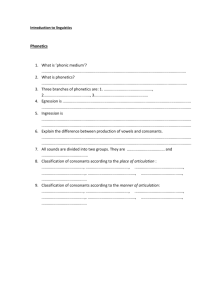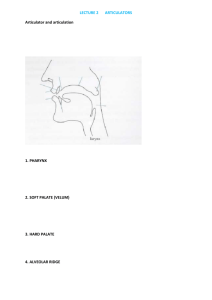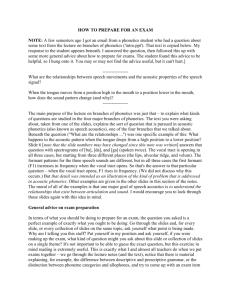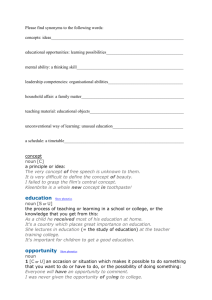Ways of looking,walking+ collective nouns+young animals
advertisement
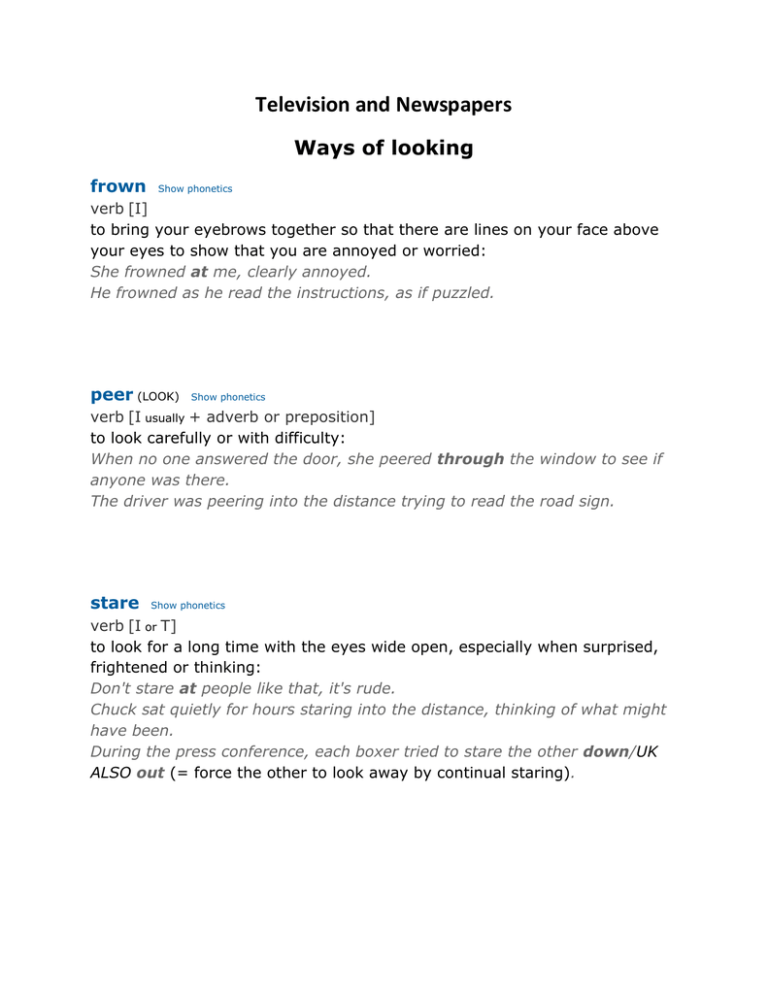
Television and Newspapers Ways of looking frown Show phonetics verb [I] to bring your eyebrows together so that there are lines on your face above your eyes to show that you are annoyed or worried: She frowned at me, clearly annoyed. He frowned as he read the instructions, as if puzzled. peer (LOOK) Show phonetics verb [I usually + adverb or preposition] to look carefully or with difficulty: When no one answered the door, she peered through the window to see if anyone was there. The driver was peering into the distance trying to read the road sign. stare Show phonetics verb [I or T] to look for a long time with the eyes wide open, especially when surprised, frightened or thinking: Don't stare at people like that, it's rude. Chuck sat quietly for hours staring into the distance, thinking of what might have been. During the press conference, each boxer tried to stare the other down/UK ALSO out (= force the other to look away by continual staring). glare (LOOK) Show phonetics noun [C] a long angry look: She gave me a fierce glare. peep (LOOK) Show phonetics verb [I usually + adverb or preposition] to secretly look at something for a short time, usually through a hole: I saw her peeping through the curtains/into the room. gaze Show phonetics verb [I usually + adverb or preposition] to look at something or someone for a long time, especially in surprise, admiration or because you are thinking about something else: Annette gazed admiringly at Warren as he spoke. He spends hours gazing out of the window when he should be working. wink Show phonetics verb [I] 1 to close one eye briefly as a way of greeting someone or showing friendliness, affection, sexual attraction etc., or of showing that you are not serious about something you have said: She winked at me as he turned his back. For a moment I thought he was being serious, but then he winked at me. glimpse verb [T] Show phonetics to see something or someone for a very short time or only partly: We glimpsed the ruined abbey from the windows of the train. glance (LOOK) Show phonetics verb [I usually + adverb or preposition] to give a quick short look: She glanced around/round the room to see who was there. He glanced up from his book as I passed. Could you glance over/through this letter and see if it's alright? blink Show phonetics verb 1 [I or T] When you blink, you close and then open your eyes quickly once or several times, and when an eye blinks, it does this: You've got something in your eye - try blinking a few times. Walking stray Show phonetics verb [I] 1 to travel along a route that was not originally intended, or to move beyond a limited area: A herd of cattle had strayed into the road. They got lost when they strayed too far from the footpath. The ship strayed off course during the storm. creep (MOVE SLOWLY) Show phonetics verb [I usually + adverb or preposition] crept, crept to move slowly, quietly and carefully, usually in order to avoid being noticed: She turned off the light and crept through the door. Someone was creeping around outside my window. The spider crept up the wall. The traffic was creeping along at a snail's pace. wander (WALK) Show phonetics verb [I or T] to walk around slowly in a relaxed way or without any clear purpose or direction: We spent the morning wandering around the old part of the city. She was found several hours later, wandering the streets, lost. He was here a moment ago but he's wandered off somewhere. stagger (MOVE) Show phonetics verb [I usually + adverb or preposition] to walk or move with a lack of balance as if you are going to fall: After he was attacked, he managed to stagger to the phone and call for help. crawl (MOVE) Show phonetics verb [I] to move slowly or with difficulty, especially (of a person) with the body stretched out along the ground or on hands and knees: The child crawled across the floor. The injured soldier crawled to safety. The lorry crawled noisily up the hill. Megan has just learned to crawl. limp (PERSON/ANIMAL) Show phonetics verb [I] to walk unevenly and slowly because of having an injured or painful leg or foot: Three minutes into the match, Jackson limped off the pitch with a serious ankle injury. trip (LOSE BALANCE) Show phonetics verb [I or T] -ppto lose your balance after knocking your foot against something when you are walking or running, or to cause someone to do this: He tripped and fell over, grazing his knee. That cable is dangerous. Someone might trip over it. He was sent off for deliberately tripping Robson when he was about to score a goal. stroll Show phonetics verb [I] to walk in a slow relaxed manner, especially for pleasure: We could stroll into town if you like. dash Show phonetics noun 1 [S] when you run somewhere very quickly: I made a dash for the toilets. There was a mad dash for the exit. As soon as the rain dies down I'm going to make a dash for it (= run somewhere very fast). march (WALK) Show phonetics verb 1 [I or T] to walk with regular steps keeping the body stiff, usually in a formal group of people who are all walking in the same way: The band marched through the streets. The soldiers marched 90 miles in three days. 2 [I] to walk somewhere quickly and in a determined way, often because you are angry: She marched into my office demanding to know why I hadn't written my report. trudge Show phonetics verb [I usually + adverb or preposition] to walk slowly with a lot of effort, especially over a difficult surface or while carrying something heavy: We trudged back up the hill. I'd had to trudge through the snow to get there. slip (SLIDE) Show phonetics verb [I] -ppto slide unintentionally: She slipped on the ice. Careful you don't slip - there's water on the floor. The razor slipped while he was shaving and he cut himself. Collective Nouns flock (GROUP) Show phonetics group noun [C] a group of sheep, goats or birds, or a group of people: a flock of sheep/goats/geese The shepherd is bringing his flock down from the hills. A noisy flock of tourists came into the building. The vicar invited all the members of his flock (= all the people who go to his church) to attend the special service. herd Show phonetics group noun [C] 1 a large group of animals of the same type that live and feed together: a herd of cattle/elephants/goats shoal (FISH) Show phonetics group noun [C] 1 a large number of fish swimming as a group: We could see shoals of tiny fish darting about. Piranhas often feed in shoals. pack (GROUP) Show phonetics noun [C] 1 a group, set or collection of something: The information pack consists of a brochure and a map. 2 a group of animals such as dogs, which live and/or hunt together: a wolf pack a pack of wild dogs bunch Show phonetics noun 1 [C] a number of things of the same type fastened or closely grouped together: a bunch of flowers/grapes/bananas/keys MAINLY US INFORMAL The reorganization will give us a whole bunch (= a lot) of problems. set (GROUP) Show phonetics noun [C] 1 a group of similar things that belong together in some way: We bought Charles and Mandy a set of cutlery as a wedding present. I always keep a tool set in the back of my car. The doctor said that he hadn't seen this particular set of symptoms before. We need to establish a new set of priorities. 2 a number of items or pieces of equipment needed for a particular activity, especially playing a game: a chess/train/chemistry set bundle (TIED OBJECTS) Show phonetics noun [C] a number of things that have been fastened or are held together: a bundle of clothes/newspapers/books a bundle of sticks crowd Show phonetics group noun 1 [C] a large group of people who have gathered together: A crowd of about 15 000 attended the concert. swarm (INSECTS) Show phonetics noun [C] a large group of insects all moving together: a swarm of bees/wasps/ants/locusts The dead sheep was covered with swarms of flies. mob (CROWD) Show phonetics group noun 1 [C] USUALLY DISAPPROVING a large angry crowd, especially one which could easily become violent: The angry mob outside the jail was/were ready to riot. a lynch mob Fifty people were killed in three days of mob violence. fleet (SHIPS) Show phonetics noun [C] a group of ships, or all of the ships in a country's navy: a fleet of 20 sailing ships a fishing fleet The British fleet sailed from Southampton early this morning. gang Show phonetics group noun [C] 1 a group of young people, especially young men, who spend time together, often fighting with other groups and behaving badly: Fights among rival gangs account for most murders in the city. 2 a group of criminals who work together: a gang of armed robbers stack (PILE) Show phonetics noun [C] 1 a pile of things arranged one on top of another: He chose a cartoon from the stack of videos on the shelf. crew Show phonetics noun 1 [C + singular or plural verb] a group of people who work together, especially all those who work on and operate a ship, aircraft, etc: an ambulance/lifeboat crew a TV/film/camera crew The aircraft has/carries a crew of seven. See also aircrew. flight (AIRCRAFT) Show phonetics noun [C] an aircraft that is making a particular journey: Flight 474 to Buenos Aires is now boarding at gate 9. suite (SET OF ROOMS) Show phonetics noun [C] a set of connected rooms, especially in a hotel: The singer was interviewed in his £1500 a night hotel suite. They've got a whole suite of offices on the 34th floor. clump (GROUP) Show phonetics noun [C] a group, especially of trees or flowers: a clump of grass/daffodils congregation Show phonetics group noun [C] a group of people gathered together in a religious building for worship and prayer: The vicar asked the congregation to kneel. audience (GROUP OF PEOPLE) Show phonetics group noun [C] the group of people gathered in one place to watch or listen to a play, film, someone speaking, etc., or the (number of) people watching or listening to a particular television or radio programme, or reading a particular book: She lectures to audiences all over the world. The secret to public speaking is to get the audience on your side. The audience was/were clearly delighted with the performance. The magic show had a lot of audience participation, with people shouting things to the performers and going up on stage. The television company has lost a large part of its audience (= the group of people who watch its programmes) since it changed its programming. Her latest book should appeal to a large audience (= many people will want to read it). Young Animals piglet Show phonetics noun [C] a baby pig: The sow had eight piglets. calf (ANIMAL) Show phonetics noun [C] plural calves a young cow, or the young of various other large mammals such as elephants and whales See also calve. kitten Show phonetics noun [C] a very young cat foal Show phonetics noun [C] a young horse cub Show phonetics noun [C] a young lion, bear, wolf, etc. See also cub (scout). duckling Show phonetics noun [C or U] a young duck, or its flesh when used as food chick (BIRD) Show phonetics noun [C] a baby bird, especially a young chicken puppy Show phonetics noun [C] (ALSO pup) a young dog: Our dog has just had four puppies. a dalmatian puppy lamb Show phonetics noun [C or U] a young sheep, or the flesh of a young sheep eaten as meat: lambs gambolling about in the fields lamb chops roast lamb See also mutton. kid (ANIMAL) Show phonetics noun 1 [C] a young goat
